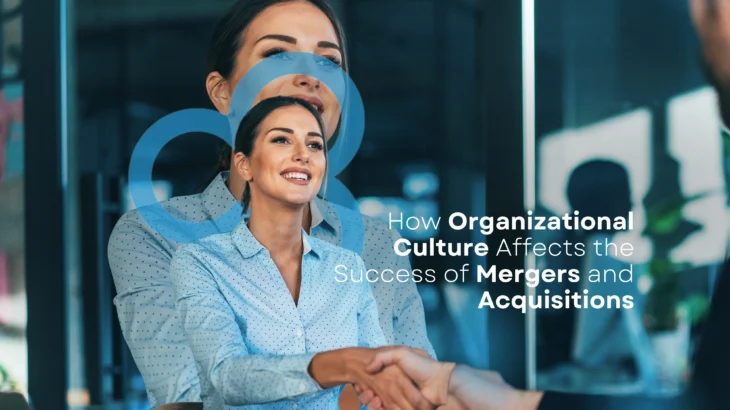
In a competitive global market, mergers and acquisitions (M&A) have been one of the main strategies adopted by companies to expand their operations, increase market share, and improve competitiveness. However, while financial and operational aspects are meticulously planned, there is one factor that is often overlooked: organizational culture.
Neglecting this aspect can hinder post-merger integration and, consequently, impact the success of the transaction. In this post, we will explore the crucial role of organizational culture in M&A processes, the most common challenges, and the best practices to overcome cultural barriers.
The Role of Organizational Culture in Mergers and Acquisitions
Organizational culture is a set of values, beliefs, and practices that define behavior within a company. It shapes how employees interact, make decisions, and carry out their daily activities.
In an M&A process, two companies with distinct cultures come together, and successful integration depends on how these differences are managed. Therefore, organizational culture plays a central role in the integration of people, processes, and structures.
Impact of Culture on Post-Merger Integration
Studies show that up to 70% of mergers and acquisitions fail to meet their initial objectives, and one of the main reasons for this is the cultural incompatibility between the companies involved.
When two organizations have very different ways of operating, post-merger integration can create friction, reduce productivity, and even result in the loss of key talent.
Examples of cultural clashes include:
- Different leadership styles: One company may value a rigid hierarchical structure, while the other may have a more flexible and collaborative approach.
- Approach to innovation: One organization may have a risk-averse culture, while the other may encourage experimentation and innovation.
- Internal communication: Differences in how teams communicate can lead to misunderstandings and a lack of alignment in objectives and strategies.
These differences can affect everything from employee morale to the effectiveness of executing new directives and strategies.
A lack of adequate cultural integration can compromise not only the financial gains expected from the merger but also the reputation and sustainability of the companies involved.
Most Common Challenges in Cultural Integration
- Resistance to change
An organization’s culture is deeply rooted and changes slowly over time. When a merger or acquisition is announced, it is common for employees to resist change, fearing the loss of their corporate identity and job stability. This resistance can hinder the adoption of new processes and systems. - Value misalignment
Value alignment between companies is crucial for building mutual trust. When the two companies involved have conflicting values—such as differences in focus on customers, innovation, or sustainability—the integration process can be hampered, leading to a loss of synergies that could have been gained from the merger. - Communication problems
Communication is a key element for the success of any organizational change. However, in M&A processes, communication failures can occur when one organization’s expectations are not clearly conveyed to the other. This can result in confusion, frustration, and a tense work environment.
Best Practices to Overcome Cultural Barriers in M&A
Overcoming cultural challenges in an M&A process requires strategic planning and deliberate actions by the leadership of both companies. Below are the best practices to facilitate this integration:
- Pre-merger cultural assessment
Before closing the deal, it is important to conduct a thorough cultural assessment of the companies involved. This can be done through interviews, internal surveys, and analysis of organizational behaviors. The goal is to identify areas of cultural convergence and divergence that may affect integration. - Establishing a unified cultural vision
Once the merger or acquisition is announced, it is essential for the leaders of both companies to establish a clear and unified vision for the new organization. This includes creating a new set of values that respect the existing cultures but also define the path forward. - Leadership involvement
Leadership plays a fundamental role in cultural integration. Leaders from both companies must be actively involved in the process, promoting open dialogue and encouraging collaboration between teams. Additionally, it is important that leaders demonstrate visible commitment to cultural integration by setting an example. - Clear and transparent communication
Maintaining constant and transparent communication throughout the M&A process is critical to mitigating resistance to change. This includes holding regular meetings, sending internal announcements, and creating open channels for employees to express their concerns and questions. - Cultural integration programs
Implementing cultural integration programs that promote the exchange of experiences between employees of both companies is an excellent way to reduce cultural barriers. These initiatives can include workshops, integration events, and mentoring sessions where employees can learn from each other and adapt to new practices.
A Successful Integration
Organizational culture is a critical factor for the success of mergers and acquisitions. Successful integration goes far beyond aligning financial and operational processes—it involves a deep understanding and management of the cultural differences between organizations. When well planned and executed, cultural integration can not only avoid conflicts but also generate synergies that drive the growth of the new organization.
At 3Capital Partners, we understand the importance of successful cultural integration in M&A processes. Our team of experts offers strategic support to ensure your company is prepared to handle cultural challenges and maximize the value of your transaction. Contact us to discover how we can help your organization achieve success in mergers and acquisitions.



